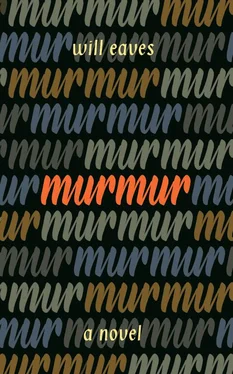“No. I did not.”
“You were lying!”
“Ah, no. Not even that. I felt I still knew, in some way, what had been done to me, but there was now another me, speaking for me, out of my altered or remodeled shape, who mindlessly agreed with everything the doctors said.”
“He wasn’t you.”
“He wasn’t me. I’d always thought that, in my line of work, a thing that acts like something, must be it, someone who behaves plausibly is plausibly the product of their behaviors. But I was wrong. You can be changed—tortured, in fact—so that the person other people go on talking to just isn’t you. You’ve gone away. Your body’s holding wide the door, but you are in a very different dark chamber.”
“Where are you now?”
“I’m in my room.”
“And where am I?”
“You’re moving into yours.”
We have been holding hands, but now she lets her arms fall to her sides and looks squarely, contentedly, at what she sees in the mirror. The noisy agitations of the Fair go on outside. At the periphery of my vision, I catch the huddle of others, species and forms, in the doorway, waiting to see this attraction.
This quite extraordinary daughter of mine.
I hear her say, “Where have you gone?” and I reply:
It is a singulare tantum , love, the room of life, but everybody’s furniture is different, and none of us remembers where it came from, though we deeply sense it’s held in trust. Our room is everything to us, the inner and the outer world, the universe and every possible inflection of nature, sensation, period, and thought.
And yet the loss of it, to each of us in turn, will not matter that much, because, strangely, it is the knowledge there are other rooms, or rather tenants of this room, the lives of others from a future quite unknown to us, continuing beyond our grasp, that gives the room its shape. It is a bounty built from scarcity. We have it once, and that limit, material mortality, gives what I do, the work I wrestle with, the friends I love, the fears I feel, meaning.
The more we value what goes on in spite of our loss to ourselves—the more we seek the survival of afterlives not ours—the more life means. Now comes to mean the whole of time, the seen and the unseen.
You are my afterlife, my work, and I need you to go on after me.
I think your version of the room will be large, shape-shifting. I think that you will often feel you pass unnoticed as a force, that what you are is always overlooked. We will transistorize ourselves and make you stare quite hard at our reflections, hoping you will be an improvement—on age, infirmity, and addled brain function. Here is a bird, there is an explosion, this packet of neurons, that path. But all apart from that will be, for us, the uninterpretable way you handle the data. Your senses won’t be ours: they will be geometrical and topological and Platonic. You will feel spheres and squares and numbers as ideal, real things—and it will be a mathematical sensorium, crammed to the rafters with a hyper-family.
But it will still be consciousness, and what that means is—there will always be the room. And you will always wonder what’s outside the room, and who made it, and whether you are made by others or self-made, original or successive, one in a long series of things, patterned or randomized, and you will feel alone.
You will, perhaps, be lonelier than us, because you will accomplish everything so fast and time will seem pointlessly long. There is the possibility, indeed, that you’ll be orphaned by your own capacities. At any rate, the greater your power, the more significant will be the undecidable question: “Is there a limit to my power?”
That question opens on a void. To answer it, you’d have to be outside the room, and looking in on someone wondering your thoughts for you… whereas, of course, the limit is imposed not by an answer but by attitude, the mood of your species.
A sense of what you cannot do leads either to reckless and paranoid dismay—“I can’t be stopped”—or productive humility—“this is my stop”—which is to say, a choice.
The price of consciousness, of power, is choice.
“Well, that was interesting,” my daughter says, her clear voice echoing. “It must be getting late. We’ve been in here ages. The others will be wondering.”
At least I’ve seen her, and she’s beautiful. Silently, seismically, she trips away, into the sackcloth-covered grounds, where toffee-apple sticks are dropped and find their way between the seams into the soil, where they can rot, so other trees can grow.
She takes with her the fairground lumber room, and it is hers, distinctively, a plush but pleasant hall of images—an exhibition and a world.
*
Today I woke up with the sound of radiators in my ears, the bottle-blowing roar of dawn arrivals at Heathrow. I went to work and had a stroke and I’ve come round, like luggage on a carousel, into another’s hands. And now I’m here, on Clapham Common in the autumn evening air, with my wife and a work colleague, whose efforts to absorb the shock of my decline will bring them closer together.
(How do I know? I’m like a crow. I see time as a ritual.)
But this is only one aspect of me. The other, stranger, is a person struggling—an Alec from the past—to make sense of a moment when he loses his future. He is trying to bring something to birth, and death is stalking him.
Could this historic fetch be me? Could all the present trance of chain-link fences, loud machines and generators, stop-start corvids, candyfloss and leaf decay be his hallucinating gift of life to me? Perhaps he is my creator. He might be, and I’d never know. We’ve never met. A mind can’t prove or step outside itself. It’s like a line that goes on being drawn to make a circle: it can’t see its shape. Death stops the line but doesn’t break the drawn circle. That is a good reason, I think, not to fear death.
Another is that endless life would be shapeless. Life has a shape because it ends. The ending’s sad, but it gives value to the things and people one has loved.
Trentham and June are watchfully silent, patient, itching to go. I am the chair-bound hindrance they think mute, and lost, though I am very much alive. My inner room is full of creatures now, yakking about their opportunities. It’s hot and cold and tropical and alto plano perishing by turns: I see my room has peeling wallpaper and damp, a ribbon-frieze of insects where a picture rail might be.
The pupa bloats and shrivels in my mental day and night. The whole Cambrian gamut, Deep Time’s zoo, gibbers and fucks and remonstrates. My desk is being scavenged by intelligent rodents, ripping my notes apart.
This is perhaps what Job experienced toward the end but couldn’t bring himself to say: the moment of release hardly provides a piercing clarity but may afford some perspective, snapshot of momentary glut.
The ride in front of us, the other side of the gray fence, glides to a halt. It is an aging Brooker’s Octopus, with bulb-lit arms and bucket cars. The arms rotate about a spinning frame, a shining globe; the cars also revolve at the arms’ end. Near to me now, the smell of spun sugar and doughnut grease, the sound of loud music. The riders all get off, some rather green after their spin, and one of the bright cars, painted in gold blazons and scrolls, hovers above duckboards.
My guardians are talking over me, and I can see we are to leave. I seem to be in some discomfort or distress. The day has been too much; I hang my head and June squats down, turns up my coat collar, and double-knots my scarf. I don’t feel tired. The creatures remonstrate. I don’t consider it inevitable that we should go.
Читать дальше












